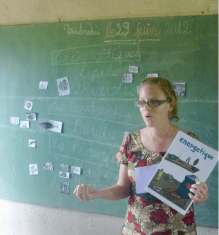Peace Corps Expands Post-Grad Experience
This is an excerpt post from the Central Florida Future, read their full story here.
Joining the Peace Corps isn’t just for students who are trying to avoid the job search after graduation. Volunteering overseas can be a résumé booster for those who can make the months-long commitment.

UCF Political Science alumna Lindsy Townsend.
Alethea Parker, public affairs specialist at the Peace Corps Southeast Regional Recruitment Office, said becoming a Peace Corps volunteer gives college graduates a competitive advantage.
“[The Peace Corps] has humanitarian appeal,” Parker said. “They go because they can build goodwill overseas. They’re making a difference.”
Jessica Lampron, UCF campus recruiter, said not all applicants need a four-year degree to serve in the Peace Corps. Only 80 percent of volunteers are college graduates. However, applicants must be flexible as to where they are willing to serve for their 27-month term. There are many volunteers who do not make it through the nine- to 12-month application process due to personal reasons. Volunteer benefits while serving include student loan assistance, living allowance, full medical and dental coverage and vacation time.
Lindsy Townsend returned from Burkina Faso in West Africa in November after 25 months of serving as a Peace Corps volunteer. Living like a local didn’t mean hardship — she had running water and electricity — but she did go without the Internet, which she said wasn’t very difficult.
“Now that I’m back, it’s weird doing more than one thing in a day,” she said. “Life was much slower there.”
Townsend graduated with a degree in political science and international studies in 2010 and hopes to find employment in the public health industry in Washington D.C. with the experiences the Peace Corps gave her.
In Burkina Faso, she worked with the local elementary schools, taught health lessons and participated in summer camps. The village she stayed at was home to more than 2,000 people, and she said she felt so safe it wasn’t uncommon for her to leave her doors unlocked or sleep outdoors.Townsend became very close to her neighbors and had to adapt to the Burkina Faso people’s view of alone time.
“There was no such thing as privacy,” she said. “But the people are so wonderful. If someone shifty was coming through [the village], they would look after me.”
Townsend noticed a big difference between the Burkina Faso way of life and the one in her home city of Bradenton when she returned and visited her high school classrooms.
This is an excerpt post from the Central Florida Future, read their full story here.
